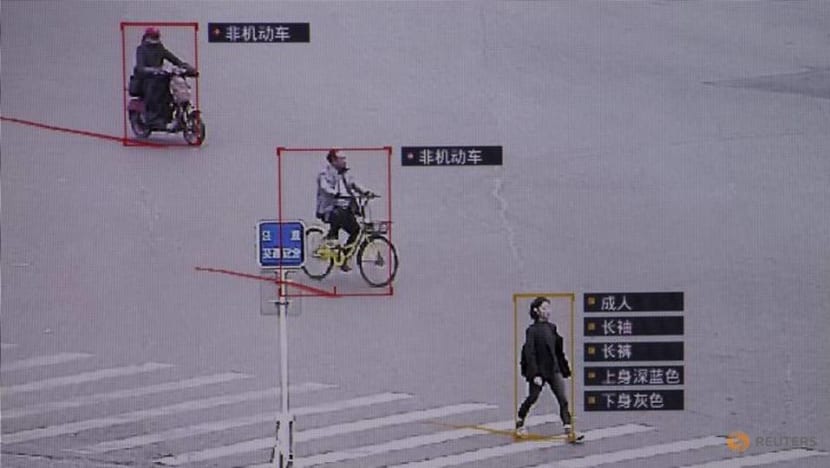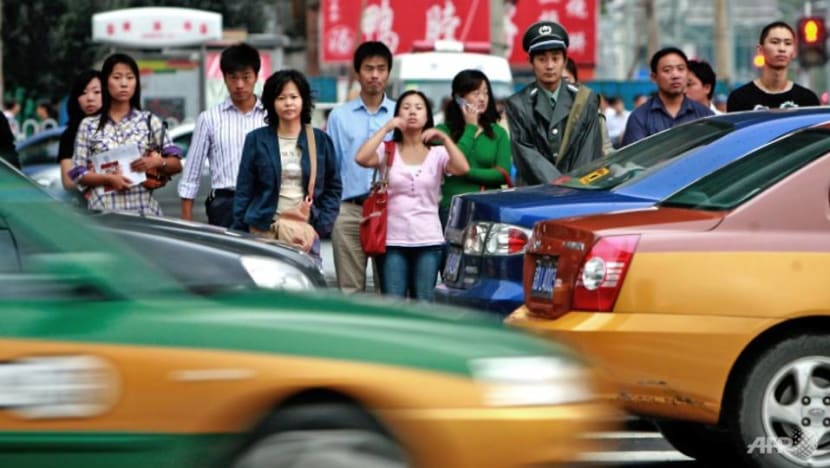commentary Commentary
Commentary: Actually, China’s social credit system isn’t the first
And we ought to expect even more countries to use behavioural economics to nudge good citizen behaviour, says China commentator Tom McGregor.

A surveillance software identifying details about people and vehicles shown in this demonstration in Beijing, China on Oct 11, 2017. (Photo: REUTERS/Thomas Peter)
BEIJING: Western media reports have swirled about China’s social credit system, which is intended to nudge Chinese citizens to adopt good behaviour, including motivating them to pay outstanding debts and fines, as well as encouraging them to obey the country’s laws and regulations.
A POINTS SYSTEM
China’s social credit system operates on a points system. If you are a law-abiding citizen who pays your dues in a timely manner, the government rewards you with welfare benefits, low interest rates on loans and more.
But criminals, delinquents, and those who are default on debts, as well as those indicted for bad behavior when traveling overseas will have lower social credit rankings and be marked as having a “delisted” status.
“Discredited” Chinese citizens face greater scrutiny from the public, meet tougher challenges when applying for new credit cards, getting bank loans and in more severe cases, may be blocked from buying airlines or train tickets, until they repay their outstanding debts and fines.
READ: Rating citizens - can China’s social credit system fix its trust deficit? A commentary
While media reports have sensationalised this social credit system, China cannot take credit for the ethos and thinking behind its design that advocates strong, hurtful disincentives for unwanted behaviour.
Similar social credit systems have already been enforced in many other countries around the world. Examples include the US-based FICO credit system.
Japan enforces strict health requirements for its national health insurance, such as requiring people to see a dietitian and counsellor if their waistline exceeds certain limits. French President Emanuel Macron has also called for a new law to ban so-called political extremists for life on social media accounts.
Sweden has taken it to new levels with a rice grain-sized microchip that can be implanted under the skin of one’s hand to replace the need for keys, credit cards and train tickets. It might sound shocking but over 4,000 Swedes have adopted the technology.

KEEPING HOUSEHOLD DEBT IN CHECK
Nevertheless, there’s no denying that China’s social credit system has enforced more Orwellian methods than anywhere else. No doubt name-and-shame moves to put the faces and names of perpetrators who jaywalk might seem disproportionate.
Some developments that might cause the Chinese government to relax its rules are underway.
The country is shifting away from an exports-driven and manufacturing-based economy and leaning on consumption and services-oriented sectors to become key drivers of the domestic economy – meaning that the country’s priority will be to encourage its citizens to spend more to keep money circulating in the country.
But that’s not a fool-proof solution for sustainable development and could lead to more Chinese defaulting and amassing huge household debt. The South Korean economy has already struggled under similar circumstances.
Many Asian countries have long enjoyed good reputations as savers, not spenders, but decades ago, South Korean credit market was liberalised and over many years, “cheap money” turned price-conscious South Koreans into debt-ridden shop-a-holics. That has sowed a harvest of misfortune.
According to the Bank of International Settlements, Seoul’s household debt stood at 96.4 per cent of GDP at the end of the second quarter in 2018, up 2.4 percentage points from the previous year.
The burgeoning household debt has been cited as a chief risk for the country’s precarious economic recovery.

Meanwhile, Japan’s household debt to GDP stood at 57.1 and China’s - 48.0. As we can see, Chinese households have continued to prioritise savings, but if credit markets open up, the potential for super-charged spending habits by the Chinese to encroach on growth could pose a grave threat to the domestic economy.
Still, China does not wish for its citizens to engage in out-of-control shopping patterns. Despite rapid modernisation, Chinese culture promotes thriftiness and control over personal finances. But when there’s temptation for easy credit, anyone may feel an urge to splurge.
READ: China's tax reforms and Xi Jinping’s fiscal Reaganomics, a commentary
Meanwhile, other countries have awoken to the threat posed by growing consumerism, and are beginning to implement similar measures to control household debt.
Germany has a credit scoring system known as Schufa similar to FICO, but grades Germans on how healthy they are as well by offering them cheaper premiums if you share data from your fitness tracker proving you’re keeping active.
CHINA’S SOCIAL CREDIT MAY GO MAINSTREAM
China’s social credit system is here to stay and there’s no turning back the clock. It’s not the first and as the model proves over time its effectiveness, we can expect even more countries to adopt similarly designed systems based on behavioural economics to nudge behaviour.
Many of the measures may seem politically incorrect but countries should be left to their devices to determine what slate of incentives and disincentives are appropriate to their national context.
What might be interesting is if governments cooperate to factor in points lost and gained when their citizens head to another country. That might open up a can of worms from the perspective of jurisdiction and values.
Meanwhile, the Chinese don’t mind the social credit system so much – if that secures order and discipline on a societal level.
Tom McGregor is a commentator on Asia-Pacific affairs based in Beijing.














